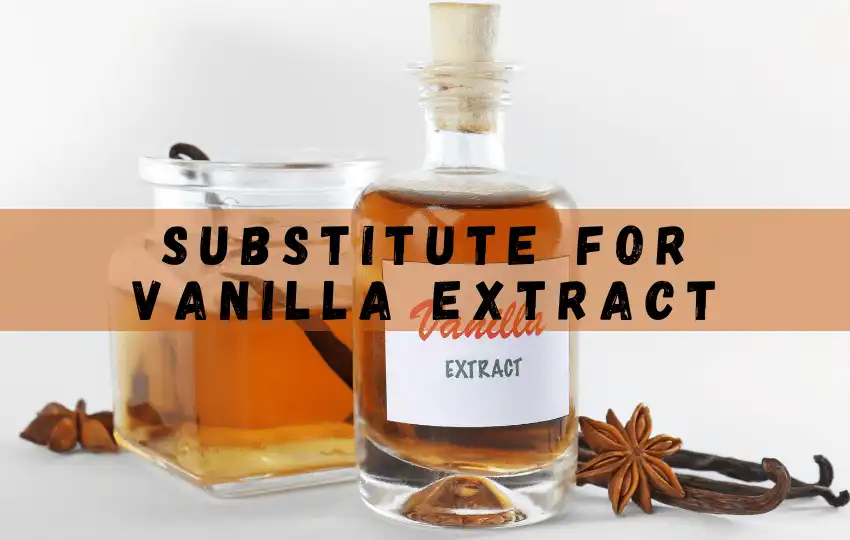Vanilla extract is a staple in multiple kitchens, but what do you do when you run out or don’t have any on hand?
Fear not, because there are many tasty and easy-to-find alternatives to vanilla extract that you can use in recipes.
From spices to other extracts, we’ve got you covered with 16 ideal substitutes for vanilla extract, along with the ratios and tips on how to use each one in your cooking and baking.
In short, " What can I use instead of vanilla extract?" Almond Extract, Maple Syrup, Cinnamon, Lemon or Orange Zest, Coconut Milk, Lavender, Peppermint Extract, Orange Extract, Coconut Extract, Rum, Bourbon and many more.
What is vanilla extract, and what does vanilla extract flavor like?
Vanilla extract is a liquid produced by soaking vanilla beans in alcohol and water.
It has a rich, sweet flavor with subtle notes of caramelized sugar, toasted marshmallow and raisins.
Uses of vanilla extract
Vanilla extract is one of the most famous ingredients in baking and desserts. It adds a unique sweet flavor and aroma to cakes, cookies, custards, and other baked goods.
Vanilla extract also has a number of non-culinary uses. For example, vanilla extract can be used as an air freshener as its pleasant smell can make any room feel more inviting and cozy.
Furthermore, it can be used as an insect repellent due to its strong aroma that bugs find unappealing.
Vanilla extract can even be used in homemade body lotions, creams, and soaps for its natural moisturizing properties, which leave skin feeling soft and smooth.
Finally, it can be added to bath water for a calming effect or added to aromatherapy candles for an uplifting fragrance.
In addition, Vanilla extract has also been shown to lower cholesterol levels in rats, but again more research is needed before any definite conclusions can be made regarding its effects on humans.
Where to buy vanilla extract?
If you are looking for where to buy vanilla extract, there are a few different places you can go. Many specialty food stores carry it, as do some international grocery stores.
You can also order online from many retailers that provide a variety of diverse flavors and types of vanilla extract.
Best substitutes for vanilla extract
1. Almond Extract – a good substitute for vanilla extract
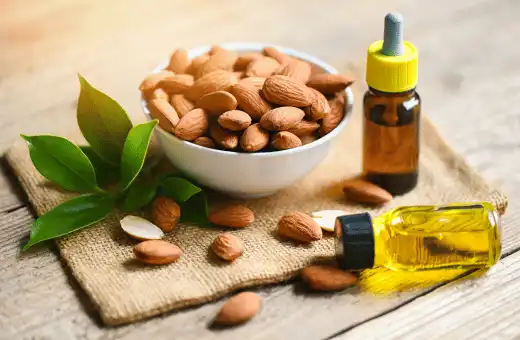
If you like almond flavor, almond extract can make a great substitute for vanilla extract.
Ratio or measurement: Use the same amount of almond extract as called for vanilla extracts in recipes.
The almond extract works especially well in baked goods like cakes, cookies, and pastries.
2. Maple Syrup
Ratio or measurement: Maple syrup is a natural sweetener that can be used in place of vanilla extract 1:1 in recipes.
Its rich and complex flavor can add depth to your baked goods, oatmeal, and even coffee drinks.
3. Try Cinnamon in place of vanilla extract
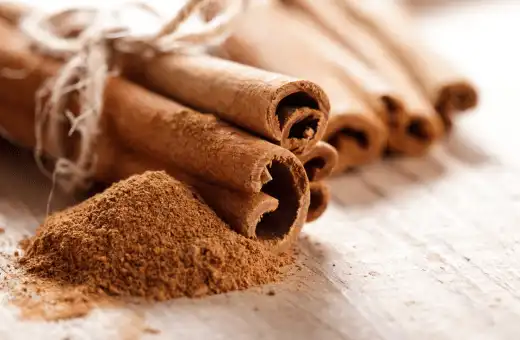
Cinnamon is a spice that is frequently used in baking and desserts. The warm, sweet, and woody notes of cinnamon can make it an ideal substitute for vanilla extract.
Ratio or measurement: Use the same amount of cinnamon as vanilla is called for in recipes.
4. Lemon or Orange Zest
The flavors of citrus zest (the peel of the fruit) can bring a bright and refreshing taste to your recipes.
Ratio or measurement: For a dish that calls for vanilla extract, you can add 1 teaspoon of either lemon or orange zest instead.
This can work well in both savory and sweet dishes.
5. Coconut Milk – a great alternative to vanilla extract
Coconut milk can make a great alternative to vanilla extract, especially in recipes that call for dairy or other plant-based milk.
Ratio or measurement: For a recipe that needs 1 teaspoon of vanilla extract, use 1 teaspoon of coconut milk instead.
This will provide a slight coconut flavor and a creamy texture.
6. Lavender
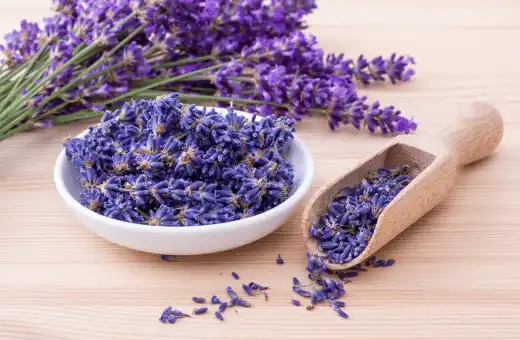
Lavender is a famous herb known for its calming and relaxing effects. It can also add a unique floral flavor to your recipes.
Ratio or measurement: Use one teaspoon of dried or fresh lavender flowers instead of vanilla extract.
7. Use Peppermint Extract instead of vanilla extract
Peppermint is a refreshing, cooling flavor that can be used in place of vanilla extract.
Ratio or measurement: Add 1 teaspoon of peppermint extracts to recipes that call for vanilla extract.
Peppermint extract is especially good in chocolate desserts like brownies, fudge, and hot cocoa.
8. Orange Extract
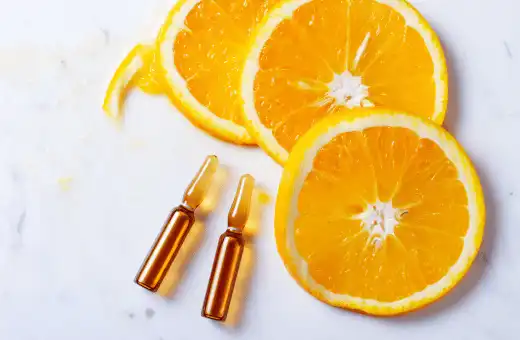
The orange extract has a fresh, citrusy taste that’s fantastic in baked goods or glazes.
Ratio or measurement: It's a bit bolder than vanilla extract, so start with half the amount of vanilla extract in your recipe, then add more as desired.
9. Coconut Extract – a decent replacement for vanilla extract
Coconut extract has a sweet aroma that matches various recipes, from baked goods to savory soups and stews.
Ratio or measurement: Use a 1:1 ratio to replace vanilla extract in your recipes.
10. Rum
Rum is an ideal substitute for those looking to give their desserts a slight kick.
Ratio or measurement: When substituting rum for vanilla extract, use half the amount (1/2 teaspoon per 1 teaspoon), as rum is much stronger than vanilla in flavor and aroma.
Rum enhances the flavor of sweet treats like cakes, brownies, muffins, and more.
11. Bourbon – similar taste to vanilla extract
Ratio or measurement: Like rum, bourbon serves as an excellent substitute for vanilla extract but should be used at half the amount (1/2 teaspoon per 1 teaspoon) due to its intense flavor.
Bourbon’s rich smoky notes blend perfectly with chocolate-based desserts such as cakes or brownies, as well as fruity pies or crisps.
12. Fruit Concentrates
Many fruit concentrate products are available that can be used as substitutes for vanilla; these come in flavors such as strawberry, raspberry, lemon, orange and more!
Ratio or measurement: These concentrates typically require twice the measurement of regular extracts (2 teaspoons per 1 teaspoon).
Use them sparingly, though – too much will make your recipe taste artificial!
13. Coffee Extracts – an ideal substitute for vanilla extract
Coffee extracts are becoming increasingly popular in baking recipes due to their unique flavor profiles and ability to bring out chocolate flavors, especially well in cakes or brownies.
Ratio or measurement: Substitute coffee extracts at twice the measurement (2 teaspoons per 1 teaspoon) – they are much stronger than regular extracts!
14. Homemade Vanilla Extract
If you have some time on your hands, you could try making your own homemade version of vanilla extract using vodka or other spirits flavored with real Madagascar Bourbon Vanilla Beans!
Just steep the beans in vodka for 6-8 weeks, then strain out the beans before using it like you would any other store-bought variety.
Ratio or measurement: One tablespoon homemade equals one tablespoon store-bought!
15. Other Spices – gives you a similar taste to vanilla extract
If you’re looking to add a little something extra to your dessert, try adding spices like cinnamon, nutmeg, cardamom or allspice.
Ratio or measurement: These can be substituted in equal measures (1 teaspoon each per 1 teaspoon of vanilla extract) for an added layer of flavor that pairs especially well with chocolate desserts!
16. Honey
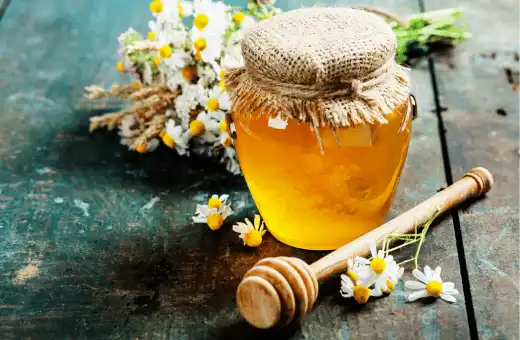
Finally, honey is a great vegan-friendly alternative to vanilla extract that adds a unique flavor to your baking.
It has notes of caramel and is slightly more mellow than regular extracts, so it pairs nicely with other flavors like almond or coconut.
Ratio or measurement: When substituting honey for vanilla extract, use half the amount (1/2 teaspoon per 1 teaspoon).
Tips on How to Choose the Most Suitable Substitution Option for vanilla extract
When choosing a suitable substitution for vanilla extract, consider the following tips:
1. Flavor profile: Vanilla extract has a distinct sweet and aromatic flavor.
Look for substitutes that have a similar flavor profile, such as vanilla bean paste, vanilla powder, or vanilla bean seeds scraped from a vanilla pod.
2. Concentration: Vanilla extract is typically concentrated, so if you’re using a substitute, you may need to modify the quantity to achieve the desired flavor.
For example, vanilla bean paste is usually used in a 1:1 ratio, while vanilla powder may require slightly more to achieve the same intensity.
3. Natural extracts: Opt for natural extracts instead of artificial ones for a more authentic flavor. Some natural alternatives to vanilla extract include almond extract, maple syrup, or coconut extract.
Keep in mind that these substitutes will impart their own unique flavors to the recipe.
4. Taste preferences: Consider the specific flavor profile you want in your recipe.
For example, if you prefer a hint of citrus, you could use orange or lemon zest to add a subtle flavor note in place of vanilla extract.
5. Recipe compatibility: Different substitutions may work better in specific recipes.
For example, using a vanilla bean pod or vanilla bean paste might be ideal for custards and desserts where you want to see the specks of vanilla.
While vanilla powder or other extracts may work better in baked goods or smoothies.
Substitute vanilla extract in French toast
An excellent substitute for vanilla extract when making French toast is almond extract. Almond extract has a sweet, nutty flavor that pairs well with French toast flavors.
It adds a layer of complexity to the dish and can help enhance its overall flavor profile. Additionally, almond extract is very affordable and easy to find in most grocery stores.
To substitute for vanilla extract, simply use half as much almond extract as you would vanilla.
For example, if a recipe calls for one teaspoon of vanilla extract, use one-half teaspoon of almond extract instead.
substitute for vanilla extract in chocolate chips cookies
When baking chocolate chip cookies, a good substitute for vanilla extract is maple syrup. This adds a pleasant, sweet flavor without overpowering the other ingredients.
It’s important to note that the ratio of maple syrup to other ingredients may have to be adjusted depending on how much sweetness you’d like your cookies to have.
For example, if you’d like your cookies to turn out sweet and chewy, try using slightly less white sugar and add a bit more maple syrup.
Additionally, you can also experiment with other flavors, such as almond extract or brandy, if desired.
Substitute vanilla extract in banana bread
Banana bread is a classic and beloved bakery treat, but did you know that it can be made without using vanilla extract?
By substituting spices such as cinnamon, cardamom, nutmeg, or allspice for the vanilla extract, you can create a delicious and unique twist on traditional banana bread.
These spices not only add flavor to the bread but also provide additional anti-inflammatory benefits due to their antioxidant content.
In addition to the spices listed above, other great flavor combos for banana bread include adding orange zest or dried fruit such as raisins or cranberries.
For an even richer flavor profile, try substituting almond extract or maple syrup for vanilla extract.
And lastly, don’t forget that chocolate chips are a great addition if you love that sweet-and-savory combination.
Substitute vanilla extract in baking
Substituting vanilla extract in baking is a common practice when vanilla extract is not available.
Many recipes call for a small amount of vanilla extract to add flavor, so it can often be replaced with other ingredients with minimal impact on the final product.
Common substitutes include imitation vanilla flavorings, almond extract, maple syrup, and coconut extract.
When using an imitation or artificial flavoring, start with half of the required amount of vanilla extract and taste prior to adding more.
Imitation flavorings are often very strong and can easily overpower the other flavors in your recipe.
Almond extract is often used as a substitute for vanilla extract due to its intense flavor.
Start by substituting half of the required amount of vanilla extract and then adjust the amount according to taste preferences.
Maple syrup is another great option to use as a substitute for vanilla extract due to its unique flavor profile and sweetness.
As with any other substitute, start by using only half of the required amount of vanilla replacement and adjust accordingly until desired results are achieved.
Coconut extract is also an excellent alternative to use in place of vanilla extract because it imparts a unique sweetness that pairs well with many baked goods like cakes and cookies.
The same rule applies when using coconut as a substitute; start by using only half of the required amount and adjust according to preference.
Substitute vanilla extract in waffles
If you don’t have vanilla extract on hand when making waffles, there are a few alternatives that can provide the same flavor.
A popular substitution for vanilla extract in waffles is almond extract, as it has a similar sweet and nutty flavor profile.
Add one tsp of maple syrup or honey to your batter to enhance the sweetness without imparting an artificial flavor.
Another option is to use a teaspoon of Vanilla Bean paste or freshly scraped Vanilla Beans.
This will bring out the natural aroma and flavor of real vanilla without the alcohol content found in extracts.
Additionally, some recipes recommend adding 1/4 teaspoon of ground cinnamon with 1/8 teaspoon of nutmeg and 1/8 teaspoon of allspice for a warm and fragrant taste.
Finally, if spiced waffles are desired, you can add half a tsp of pumpkin pie spice mix to the batter for a sweet autumn-inspired flavor.
Substitute vanilla extract in ice cream
Vanilla extract is a staple ingredient in homemade ice cream, lending a rich and sweet flavor to the dessert.
However, there are many alternatives to vanilla extract that can be used in place of it.
Maple syrup, almond extract, coconut extract, and even liqueurs such as Grand Marnier or Kahlua can all be used for a unique twist on the classic vanilla ice cream.
Each of these extracts will give your ice cream its own special flavor.
For instance, maple syrup will add a subtle earthy sweetness, while almond extract will lend a nutty flavor with hints of cherry.
Coconut extract will carry through with an intense tropical essence, while liqueurs like Grand Marnier or Kahlua offer an exotic touch to traditional ice cream recipes.
These alternatives are also easy to obtain and can be found in most grocery stores.
When substituting for vanilla extract in ice cream recipes, it is important to remember that these other liquids may have different consistencies than regular vanilla extract.
So the measurements must be adjusted accordingly.
Additionally, these flavors may pair better with certain ingredients, such as nuts or chocolate chips, than others. Experimenting with different combinations can result in truly unique desserts!
Substitute vanilla extract in the icing
The icing for this recipe can be easily modified by substituting vanilla extract for other flavors.
To do so, simply replace the amount of vanilla extract called for in the recipe with an equal amount of desired flavoring extract such as almond, coconut, lemon, or peppermint.
For a richer flavor, use pure vanilla bean paste instead of extract.
Vanilla bean paste contains both the flavor and tiny bits of the actual bean pod itself, which add a distinct taste and aroma to baked goods like cakes and cookies.
Substitute for vanilla extract in flan
Flan, a creamy custard-like dessert, commonly calls for vanilla extract as flavor.
If you don’t have any vanilla extract on hand or you’re looking for an interesting twist to your dessert, you can try substituting the vanilla extract in your flan with a number of other ingredients.
Options include almond extract, orange zest, lemon zest, brandy, bourbon or rum.
Depending on which type of alcohol you choose to use as a substitution, it will impart its own unique flavor and profile to the flan.
For example, using brandy adds a hint of sweet and subtle floral notes; while using bourbon will give the dish a smoky depth of flavor.
You can also substitute with spices such as cinnamon or nutmeg for more of an earthy flavor profile.
Whichever way you decide to go about it, be sure to experiment with small amounts at first so that you don’t overpower the delicate balance of flavors in your flan.
Substitute vanilla extract in peanut butter cooking
When baking with peanut butter, a great substitution for vanilla extract is maple syrup. Maple syrup provides a rich flavor that compliments the nutty taste of peanut butter.
You can also use honey or molasses to sweeten and add flavor to your treats.
Just be sure to use less than you would vanilla extract since these three ingredients are much sweeter.
If you need more depth of flavor, try adding cinnamon, nutmeg, cloves or allspice to your recipes. They will add complexity without overwhelming the other flavors in your dish.
Conclusion on substitute for vanilla extract
So there you have it; you don’t need to have a vanilla extract to make your recipes delicious.
These seven vanilla extract substitutes can give your baked goods, smoothies, and other treats a completely new flavor dimension.
As an experienced home cook or chef, you now have measurements and ratios to effectively use any of these vanilla extract alternatives.
Feel free to experiment with them and discover even more combinations. Happy cooking!
FAQs on substitute for vanilla extract
Q1. What is the same as vanilla extract?
Vanilla extract can be substituted with other flavor extracts, such as almond extract and peppermint extract.
Vanilla essence is another alternative to vanilla extract, although the two are not necessarily interchangeable.
Additionally, some baking recipes may call for vanilla-flavored liqueur or bourbon as a substitute for vanilla extract.
Finally, using a combination of spices and herbs such as cinnamon, nutmeg, allspice and clove may also work in recipes that call for vanilla extract.
Q2. Can I use maple extract instead of vanilla?
Yes, you can use maple extract instead of vanilla in baking recipes.
Maple extract has a rich flavor reminiscent of roasted nuts and woody caramel that gives baked goods an additional layer of complexity.
Unlike vanilla, it is also quite concentrated, meaning that you only need to use a few drops to achieve the desired level of sweetness and flavor.
Additionally, maple extract is vegan-friendly, making it a great option for those who are avoiding animal products.
Q3. Can I substitute vanilla powder for extract?
Yes, you can substitute vanilla powder for extract; however, the flavor will be slightly different. The extract is more concentrated and has a much stronger aroma than powder.
Vanilla powder is made up of ground-up beans, so it retains more of the natural flavor as opposed to extract, which is usually made with alcohol or glycerin and artificial flavors.
The intensity of flavor that the powder provides is much less than extract, so you may need to use a bit more for the same result.
Additionally, the vanilla powder also contains tiny particles of a bean, which can be visible if used in certain recipes, such as white frostings or custards.
So if you want a smooth texture without any specks, using an extract would be better suited for those recipes.
Q4. Is maple syrup a good replacement for vanilla extract?
Yes, maple syrup can be used as a substitute for vanilla extract in some recipes. However, its flavors are more subtle and sweeter than vanilla extract, so it might not work well for all recipes.
Additionally, since it is sweeter than vanilla extract, decrease the amount of sugar or other sweeteners in the recipe if using maple syrup instead of vanilla extract.
Q5. How much almond extract to substitute for vanilla?
When substituting almond extract for vanilla extract, it is recommended to use two-thirds to one-half the amount of almond extract as you would with vanilla extract.
For example, if a recipe requires one teaspoon of vanilla extract, you should use only 2/3 to 1/2 teaspoon of almond extract instead.
Almond extract has a more intense flavor than vanilla and can easily overpower a dish if used in too high of quantities.
Q6. Can honey be used instead of vanilla essence in a cake?
Yes, honey can use as a substitute for vanilla essence in a cake. It has a sweet and mild flavor that adds deepness and complexity to the overall taste of the cake.
Honey also has a slightly floral aroma, which can complement other ingredients in cakes like berries, spices or nuts.
Furthermore, honey is a natural sweetener, so it can help reduce the amount of sugar that needs to be added to cakes.
However, it’s important to note that adding too much honey can result in an overly sweet-tasting cake.
As such, it’s best to experiment with different amounts of honey until you find the desired flavor balance for your cake.
Q7. Can I use honey rather than vanilla extract in cookies?
Yes, you can use honey instead of vanilla extract in cookies. Honey has a more intense flavor than vanilla extract and can add sweetness to the cookie without having to use additional sugar.
It also has a unique flavor that complements certain cookie recipes well.
Additionally, some people prefer honey over traditional sweeteners such as refined sugar due to its natural health benefits, like providing antioxidants, minerals, and vitamins.
However, it is important to be aware that the flavor of honey will be dominant, so you may need to adjust other ingredients accordingly.
For example, spices like cinnamon or nutmeg can help balance out the sweetness of the honey and complement its flavor.
Q8. Can I use vanilla syrup instead of vanilla extract?
Yes, you can use vanilla syrup instead of vanilla extract. Vanilla syrup is made from a combination of sugar, water and natural flavorings, including real vanilla extract.
It has a milder flavor than pure extract, and the sweetness can help to balance out any bitter notes in your recipe.
One advantage to using syrup is that it is easier to pour and measure compared to the thick consistency of the extract.
Depending on the specific recipe, you may need to adjust the amount used since syrups tend to be sweeter than extracts.

